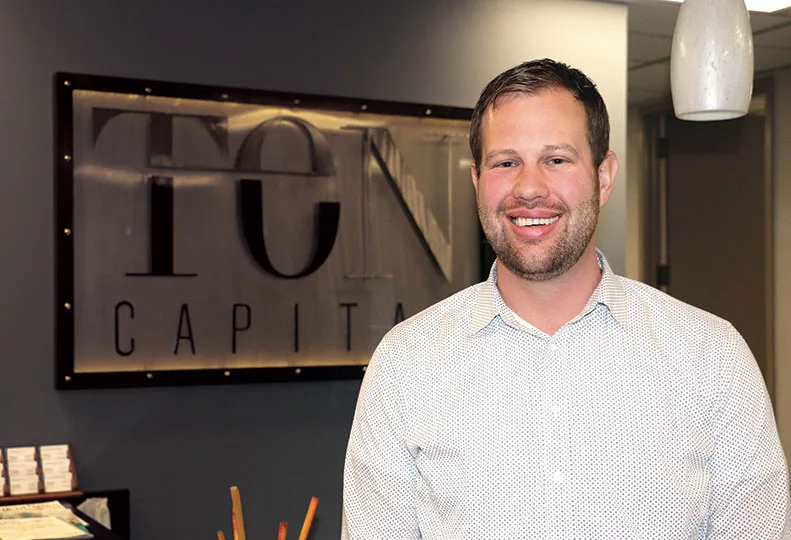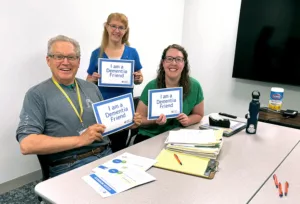
Home » Spokane advisers on the FIRE approach to investing, saving
Spokane advisers on the FIRE approach to investing, saving
Under new investment approach, some Millennials plan to save more, quit work sooner

December 6, 2018
While many of us have asked a financial adviser what steps might help us achieve an early retirement, it’s a good bet the majority of younger workers don’t really expect to be able to do so anytime soon.
Despite this, financial advisers here say there’s a growing number of young people interested in practicing extreme saving and investment methods if it means they might be able to retire in their 30s or 40s.
One of those methods is called FIRE, short for financial independence retire early. The FIRE method is described by various financial experts as a lifestyle that aims to reduce expenses and increase investing in order to gain financial independence quickly—and with that independence, the possibility of early retirement.
While most financial advisers suggest saving 12 times their yearly spending to fund retirement at the standard age of 65, proponents of the FIRE method recommend people save up to 25 times what they’d regularly spend annually, which in some cases can be up to 50 percent of their net income.
Supporters of the FIRE method advise that anyone can do it, though the method may require more cutting back for some individuals than others. However, it’s generally recognized that FIRE is more possible for people with higher salaries.
Sarah Lynn Carlson, an adviser with Spokane-based Fulcrum Financial Group LLC, says she’s seeing an exciting new wave of people under 40 who are already starting to think about retirement, something that she says is rare for the industry.
“As more millennials are getting savvy about saving and their finances, I believe methods like FIRE will continue to grow in popularity and scope,” Carlson says.
Despite its extreme approach to saving, the FIRE method appeals to millennials, who are more focused on financial freedom and not being tied to bills, a mortgage, or even a career, Carlson says.
“Compared to baby boomers, who tied a significant portion of their personal identity to what jobs they had, millennials just don’t believe their careers define them,” she says. “They aren’t as tied to money and image, they’d rather spend their money on an experience.”
Carlson points out that millennials also endured the 2008 economic collapse differently than baby boomers, which seems to have impacted how they see retirement.
“Seeing their parents and adult loved ones go through hard times and financial strain is not a path that millennials want to repeat for themselves,” she says. “I see many young people diligently living within their means, and willing to save, scrimp, and live without,” she says.
Ben Klündt, a financial adviser at Spokane-based Ten Capital Wealth Advisors LLC, says that if a client starts planning and saving early, a nontraditional retirement is possible.
“When working with clients in their 20s and 30s, we’re usually talking about trying to achieve financial independence by the age of 50 or 55, because that’s when people start to get burnt out,” he says.
He adds, “I generally recommend clients save 10 to 20 percent of their gross income over a 30-year period to be ready for retirement. But if you can save more at a younger age, that’s just less you’ll need to save later on.”
When it comes to the FIRE method, Klündt says he believes its goal of achieving financial independence is a worthy one for people of any age.
“FIRE is just an extreme version of the basic advice most financial advisers recommend, which is a lot of disciplined spending and early saving,” he says. “The goal is to get to the point where you could work, but you don’t need to, thereby leaving you with more time to pursue things you’re passionate about.”
Klündt says the FIRE method probably appeals most to young people, those who are discontent with their current job, or those that envision themselves in a simpler lifestyle. He cautions, however, that such a lifestyle may not be possible for everyone.
“Some individuals can live off less, but it’s probably not as safe or realistic for people with families to achieve,” he says. “It all comes back to income, how much you’re willing to save and how strict you can keep your budget.”
Although the FIRE method has lots of appealing aspects, Carlson also acknowledges that early retirement can have unexpected drawbacks that young people will want to consider carefully.
“Once you’ve retired, you take away the ability to have employable options and make income,” she says. “Out of the workplace, your skills aren’t as relevant, and you can’t make the same level of money.”
Carlson says the challenge for retirees of any age is having a plan that covers their basic needs in worst-case scenarios.
“When you move from accumulation to distribution mode it’s very important to anticipate and think through the bad scenarios,” she says. “With FIRE, you’d need to have enough to cover your have-to-haves, for example: health care and housing, so you’ll be in a better position to handle the markets for any want-to-haves that add value to your life.”
Like Carlson, Klündt shares the concern that retiring early can mean you have less savings to draw on for unexpected expenses down the road.
“There are a lot of things to account for, including increases in health care costs and taxes,” he says. “If you’re not working, you also won’t be contributing to a 401K, so you’re missing out on that extra cash. Most retirement accounts can’t be touched until age 59, and if you draw Social Security benefits before age 67, those benefits are also reduced.”
Additionally, Klündt points out that despite being more financially conscious, most millennials still struggle with student loans and other debt.
“Student loans and home mortgages take up a significant chunk of finances each month for people in their 30’s, which makes it harder to save to the extent that FIRE supporters advocate,” he says. “For those individuals who have loans or other significant debt, FIRE may not even be possible, as they should be looking to pay that off first.”
Abby Bushman, a wealth adviser with the Spokane office of Minneapolis-based CliftonLarsonAllen LLP, says she hasn’t had any clients ask about FIRE or other extremely early retirement planning methods.
“We start retirement conversations and planning early enough to ensure everyone is on the same page regarding goals and expectations,” she says. “We don’t want to push for early retirement if we’re not confident the client is in a good place to have success in doing that.”
Bushman, like Carlson and Klündt, says she sees some downsides to very early retirement.
“Without a paycheck, you’ll need to have enough cash flow in place to provide for yourself and support your lifestyle,” she says. “Large costs like health care are no longer sponsored by your employer, and you can’t continue to contribute to a retirement plan if you’re not employed. These are just a few things to be aware of.”
Bushman says most of her clients, unless they have guaranteed financial security, are actually contemplating working longer in order to save more for retirement.
“Retiring early is kind of tough to do,” she says. “It takes a lot of thought and planning, so if you are planning to do so, it’s best to err on the side of caution in regard to investments and planning.”
Melissa Williams, president of Spokane-based Star Financial and Insurance Services Inc, says retirement planning is different for every generation, so she’s not surprised by millennials’ fascination with FIRE.
“I haven’t heard much about FIRE, but that’s probably because most of my clients are older,” she says. “What I have heard about it sounds similar to the advice most financial advisers always give: Spend less and save more.”
Williams says early retirement is a possibility she brings up to younger clients if they’re in a good position to consider it.
“I do advise early retirees to consider what it is they’re retiring from,” she says. “A lot of people are still quite healthy and active when they retire, and many eventually feel the need to find part-time or volunteer work to stay active both physically and mentally.”
Although FIRE looks good on paper, Williams agrees that like any retirement plan, there are always variables that can’t be entirely planned for.
“It’s always hard to determine just how much money you’ll need in retirement, which is why I like to have a 10-year window with clients. That gives me time to help them find that number and test it against variables like changing interest rates, taxes, and market fluctuations,” she says.
“When you retire early that money already has to last longer than a traditional retirement amount,” she adds. “Modern medicine has also made it possible to live to an older age, so your savings may even have to last longer than you’d thought.”
While she admires the goals of the FIRE method, Williams says she would caution young people against a freestyling, do-it-yourself approach to finances.
“The good thing about it is it’s encouraging minimizing expenses and living more frugally, but like anything else, there really is no magic bullet,” she says. “A lot of these more complex plans are best attempted with the guidance of a professional financial adviser.”
When it comes to the feasibility of retiring extremely early, Carlson says Spokane might actually be one of the better cities for young people to try it.
“Spokane currently has a surging retirement community and a lower cost of living compared with some other cities,” she says. “Many people are moving here from other states because it’s more affordable.”
Latest News Up Close Banking & Finance
Related Articles
Related Products




